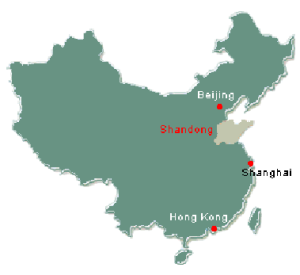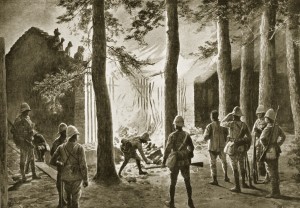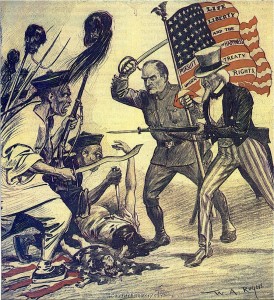what were the historical circumstances leading to the boxer rebellion?

The Boxer Rebellion was an insurgence against foreigners and Christians that erupted in eastern Cathay in the late 1890s and continued until 1901. The rebellion was eventually crushed by a joint military expedition, carried out by eight strange powers.
Who were the Boxers?
The driving force behind this uprising was a secret society called the Fists of Righteous Harmony, dubbed the Boxers past the Western press.
Members of this secretive movement were anti-foreign and anti-Christian. They were also disquisitional of the Qing authorities for its disability to resist foreign imperialism. The Boxers sought their own retribution against foreign imperialists in China, promising to "bulldoze out the foreign devils".
Righteous Harmony members learned and practised a form of kung fu (the origin of the 'Boxers' name). Some attempted to perfect a mystical skill called 'atomic number 26 shirt'. This involved toughening and tensing the body to withstand blows. The best advocates of 'iron shirt', it was claimed, would be impervious to bullets.
Trouble in Shandong province

The Boxer Rebellion began to take shape in the late 1890s, soon after German imperialists seized control of Shandong province. German language action in Shandong led to heightened tensions between foreigners and peasants in that location.
A coastal province to the southward-due east of Beijing, Shandong was known for its economic deprivation and poverty, caused to a large degree by its extreme variations in climate.
Shandong's terrain is mostly flat and abundant but its farmland could be flooded by pouring rains in one twelvemonth, and then cracked and blistered past searing drought the next. Peasants in Shandong did not accept an irrigation network to protect them from drought. They were unable to store much grain or food but lived hand-to-oral fissure from season to season.
These factors contributed to 3 devastating famines in Shandong, between the mid-1870s and the end of the 19th century. Despite their suffering, the peasants in Shandong were known for their strong provincial loyalty, their resilience and their skill every bit soldiers. The Chinese military recruited actively in Shandong for this very reason.
Attacks on High german Catholics
In November 1897, a gang of armed men flare-up into a Catholic mission in Juye and murdered two German priests. On the communication of a Catholic bishop, Johann von Anzer, the German government sent two gunboats to the Shandong coast. German agents and then bullied the Qing regime into approval a High german sphere of influence in the province.
German Catholics were compensated with iii,000 taels of silverish and allowed to fortify buildings to protect themselves from violent mobs. The Germans also forced the removal of local officials they believed were responsible for whipping up anti-foreign and anti-Christian sentiment in Shandong.
A steady menstruation of German missionaries moved into Shandong, leading to disputes over land and religious sites. In Liyuantun, the site of a erstwhile Buddhist temple was seized by Christians for the erection of a church, leading to protests and some violence.
The anti-Western violence expands

Violence against foreigners spread throughout Shandong in late 1898 and 1899. The suppression of the Hundred Days' Reforms past Dowager Empress Cixi may have given some encouragement to the rising Boxer Rebellion, which had attributed Communist china's weakness to the Guangxu Emperor.
In Oct 1899, upwardly to ane,500 Boxers massed at a Buddhist temple in Pingyuan, north-due west Shandong and did battle with a much smaller contingent of authorities soldiers. The Boxing of Senluo Temple, as information technology became known, shattered the myth that the Boxers had magical defences against bullets. Despite this, the Boxer movement continued to grow in Shandong and on the fringes of neighbouring provinces.
By the finish of 1899, gangs of Boxers were stalking around western Shandong, attacking foreigners and Chinese Christians. Buildings synthetic, owned or used by foreigners were burned or torn down. Some Chinese were even assaulted or murdered for owning or conveying a Bible, English language-language books or items obtained from Europeans.
The Boxers too busily distributed anti-foreign and anti-Christian propaganda, which took the grade of art, posters, poesy, song and rumour.
The Qing-Boxer relationship
The relationship between the Boxer movement and the Qing government was unclear and child-bearing.
At first, the Boxers and the Qing leadership were antipathetic to each other. The Boxers considered the Qing corrupt and too weak to resist strange incursions. Indeed, the Qing themselves were foreigners, Manchu rather than Han Chinese.
Inside the regime, Qing ministers condemned the Righteous Harmony movement. Li Hongzhang, China'southward de facto foreign government minister and the loudest supporter of Self-Strengthening, said that "nether any enlightened sovereign these Boxers, with their ridiculous claims to supernatural powers, would have been condemned to death long ago".
In late 1899, the Qing appointed one of China's all-time generals, Yuan Shikai, as governor of Shandong and he began suppressing Boxer unrest in the west of the province. Attitudes began to shift, however, as both the Boxers and Qing began to recognise the advantages each might provide to the other.
Cixi's support
Hoping the Boxers might drive foreigners from China, Empress Cixi gave them her cautious support. Imperial edicts in January and April 1900 legalised the formation of noncombatant militias, providing a green calorie-free to Boxer recruiting. The Qing too filtered money to Boxer leaders, to support the training of new members.
The Boxers reciprocated by using the catchphrase "Revive the Qing! Destroy the foreigner!" Cixi joined this excoriation of foreign royal powers in this 1900 statement:
"For the by thirty years [the foreigners] accept taken advantage of our state's benevolence and generosity, too as our whole-hearted conciliation to give free rein to their unscrupulous ambitions. They have oppressed our state, encroached upon our territory, trampled upon our people and exacted our wealth. Every concession made by the Courtroom has caused them, mean solar day by day, to rely more upon violence until they shrink from zero. In small-scale matters they oppress peaceful people; in big matters, they insult what is divine and holy. All the people of our country are so full of anger and grievances that every i of united states desires to accept vengeance."
The Boxers accelerate on Beijing

Past the jump of 1900, thousands of Boxer rebels were traversing north-eastern China and drawing closer to Beijing. A mood of panic swept through foreigners in the capital, who fired off reports to their home governments, while the gunboats of foreign navies lingered menacingly off the Shandong coast.
In June, more than than 20,000 Boxers flooded into Beijing and headed towards the capital's diplomatic quarter, located around the Forbidden City. Strange diplomats and officials from nine unlike countries, along with a small-scale garrison of about 400 troops, heard of the Boxer advance and gathered inside the safety of a fortified compound.
The German language legation, located beyond town, was not and so lucky. The German ambassador, Clemens von Ketteler, was killed in a street fight with pro-Boxer soldiers. Meanwhile, the foreigners within the chemical compound, low on food and armed simply with rifles and one single cannon, were besieged for almost two months (later on fabricated famous in the film 55 Days at Peking).
The Eight-Nation Alliance

Merely as their supplies were almost exhausted, the foreign legations were rescued by troops from the so-called Eight-Nation Alliance (Britain, France, Germany, Austria-Hungary, Italy, Russia, Japan and the United states of america).
This international force of effectually 20,000 soldiers entered Beijing on August 14th 1900, relieved the legations and drove the Boxers from the city. The Dowager Empress Cixi and the Guangxu Emperor both fled Beijing in handcarts and headed for the mountainous rubber of Shaanxi province.
The Eight-Nation trek occupied the Chinese uppercase for weeks, dividing it up into areas of control. Strange diplomats and troops were ordered to comb through Beijing, identifying and arresting suspected Boxers or Boxer sympathisers.
Western pillaging
The Eight-Nation forces were supposed to comport out a peaceful occupation of Beijing but many engaged in a campaign of indiscriminate annexation, violence and rape. There were reports of Western diplomats and military officers sending home cartloads of valuables pilfered from Manchu homes. The Forbidden City was raided at least twice and stripped of priceless artefacts.
There were too numerous accounts of beatings, rape and street executions. The worst offenders in this regard seemed to be German language soldiers, who were driven past a July 1900 spoken language given by their monarch, Kaiser Wilhelm 2:
"Should you encounter the enemy, he will exist defeated. No quarter shall be given. Prisoners volition not be taken. Whoever falls into your hands is forfeited. Only as a m years agone the Huns made a name for themselves under Attila… may the name German be stamped by yous in such a fashion that no Chinese volition ever again dare to look cross-eyed at a German language."
The Boxer Protocol

In September 1901 the Qing regime, represented past Li Hongzhang, was forced to sign the Boxer Protocol.
The Protocol was, in upshot, a costly peace treaty to atone for Boxer Rebellion. Mainland china agreed to pay reparations – one silvery tael for each head of population (the equivalent of nearly $US340 meg). Anti-foreign groups were banned, military restrictions were imposed and foreign troops were permanently garrisoned in Beijing.
X Qing government officials believed to have supported or encouraged the Boxers were executed. The Qing authorities was forced to issue a formal apology for the murder of the German ambassador and to erect a commemorative arch at the site of his death.
Cixi'due south return
Dowager Empress Cixi negotiated her return to Beijing and to the government – but she did and then without her one-time fire, like-minded to Western demands and later approving a program of social and political reforms.
The in one case fearsome 'Dragon Lady' spent the last years of her rule a more compliant figure, called on by Western women for tea and photographs, while the Qing authorities was just a shadow of a national government.
A historian's view:
"The ultimate global result of that summertime was the continued redrawing of the purple map of Asia. Red china spent about of the 19th century losing its power to resist the imperial powers. By the terminate, information technology institute itself unable to resist fifty-fifty the new powers in Asia, like the U.s. and Japan… The dynasty itself staggered on for only a few more than years."
David J. Silbey

1. The Boxer Rebellion was a trigger-happy movement confronting foreigners and Christians that erupted in the eastern province of Shandong in the belatedly 1890s.
2. Shandong was an impoverished province that was prone to dearth. Germans used gunboat diplomacy to class a sphere of influence at that place in 1897, leading to heightened tensions.
3. The Boxers were locals who rallied against the "foreign devils", using propaganda, martial arts, violence against foreigners and Christians and attacks on their belongings.
4. The Boxer movement expanded and invaded Beijing in June 1900. The Boxers and pro-Boxer soldiers murdered a German diplomat and laid siege to foreign legations.
5. Cixi and her regime gave measured support to the Boxer movement, which was defeated by the Eight-Nation Alliance in August 1900. A humiliating treaty, the Boxer Protocol, was later forced on China.
Citation information
Title: "The Boxer Rebellion"
Authors: Glenn Kucha, Jennifer Llewellyn
Publisher: Alpha History
URL: https://alphahistory.com/chineserevolution/boxer-rebellion/
Date published: September two, 2019
Date accessed: March 18, 2022
Copyright: The content on this page may not be republished without our limited permission. For more information on usage, delight refer to our Terms of Use.
willcockhicappeed.blogspot.com
Source: https://alphahistory.com/chineserevolution/boxer-rebellion/
0 Response to "what were the historical circumstances leading to the boxer rebellion?"
Post a Comment